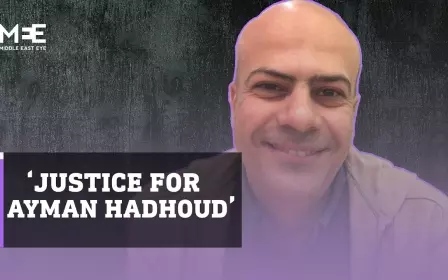Arabic press review: Abbas 'urged Palestinian MPs in Knesset to save Bennett coalition'

Abbas acted to save Bennett coalition over Netanyahu fears
Arab sources in Israel say that Palestinian Authority President Mahmoud Abbas contacted a number of Palestinian deputies in the Knesset to urge them to work to save the coalition government of Israeli Prime Minister Naftali Bennett, according to a report on the Aljarmaq news website.
Abbas contacted Mansour Abbas, a member of Bennett's coalition, and deputies Ayman Odeh and Ahmad Tibi in order to avoid the toppling of Bennett and prevent the return to power of former premier Benjamin Netanyahu, the sources told Aljarmaq, which specialises in news about Jerusalem and Palestinian citizens of Israel.
Bennett's ruling coalition lost its majority last week after Idit Silman, a member of the prime minister's Yamina party, quit.
Earlier, Silman had lashed out at Health Minister Nitzan Horowitz, after he instructed hospitals to allow leavened bread products into their facilities during the upcoming Passover holiday, in line with a recent Supreme Court ruling reversing years of prohibition.
Under Jewish tradition, leavened bread is not allowed in the public domain during Passover.
"Silman was subjected to bullying that only few persons in the history of Israel were subjected to," said Bennett, Justifying Silman's withdrawal from the coalition.
Bennett said Silman had been subjected to "months of verbal violence" from his government's opponents.
Egyptian delegation postpones Israel visit over security situation
Egyptian sources say that a scheduled high-level visit to both Ramallah and Tel Aviv by the General Intelligence Directorate was postponed due to what they described as "the incendiary security situation in Israel and the occupied territories", according to a report in the London-based Al-Araby Al-Jadeed.
One of the sources said the delegation was scheduled to arrive in Tel Aviv to meet officials from the Israeli government last Friday, before heading to Ramallah to meet Abbas and other officials.
The source explained that "officials in the Egyptian General Intelligence Directorate found that the visit under the current security situation would not be fruitful, especially in light of the decisions announced recently by Israeli Prime Minister Naftali Bennett, which were severe, and with the aim of controlling the anger of the Israeli people, due to the recent escalation of resistance operations within the occupied territories".
Since the start of Ramadan on 2 April, 17 Palestinians have been killed by Israeli fire.
The tensions have come during the Muslim holy month and ahead of the start of Passover Friday, an overlap that can heighten tensions around sacred sites in Jerusalem's Old City.
The source added that "due to the Israeli decisions, and the state of anger that controls the government there, the visit organisers in Egypt decided to address the Israeli side's request for the postponement of the visit until the receding of the state of anger within Israeli security and government circles, so that non-emotive decisions can be reached".
Majority of Jordanians do not trust government
The results of an opinion poll carried out by a centre affiliated with the University of Jordan show 64 percent of Jordanians do not trust the government of Prime Minister Bisher al-Khasawneh, a year-and-a-half after its formation, according to a report on Jordan's Ammon website.
The study conducted by the Centre for Strategic Studies also showed that only 40 percent of opinion leaders and experts trusted the government.
The poll also revealed that 82 percent of Jordanians believe that "things are not heading in a positive direction", compared to a similar poll conducted several months ago in which the figure stood at 77 percent.
The poll showed that the majority of Jordanians believed the government had succeeded in policies such as supporting the armed forces and the Palestinians.
The poll also found that 42 percent of people believed that the government had succeeded in improving the health system and increasing the number of people able to use it, while only nine percent believed the government had succeeded in providing job opportunities.
Egyptian man says Christian wife kidnapped
The disappearance of a Christian woman and her infant daughter in Egypt has sparked a wave of anger after a video was circulated on social media in which the woman announced her conversion to Islam and called on the government to protect her from her family, according to a report published in Al-Quds Al-Arabi newspaper.
Appearing in a hijab, the woman said she "has converted to Islam and changed her name" and feared her family would try to take revenge over her changing her religion.
Dr Joseph Saad, the woman's husband, said he considered the video as evidence that his wife had been kidnapped.
"Watch the video a hundred times and you will be sure that she did not film it under her own will, but rather she was forced to do so," said Saad.
"Does this seem a person that acts with full will? She is a broken human being, and she is subjected to pressure since she was kidnapped eight days ago."
He said his wife looked horrific and frightened, while the screams of his baby daughter split his heart, and he did not know what was happening to them.
Egypt has previously witnessed the disappearance of Coptic women and girls, with their families accusing "Islamic extremists" of being behind the abductions.
However, Egyptian authorities say romantic relationships are the reason for many of the disappearances.
Middle East Eye delivers independent and unrivalled coverage and analysis of the Middle East, North Africa and beyond. To learn more about republishing this content and the associated fees, please fill out this form. More about MEE can be found here.






